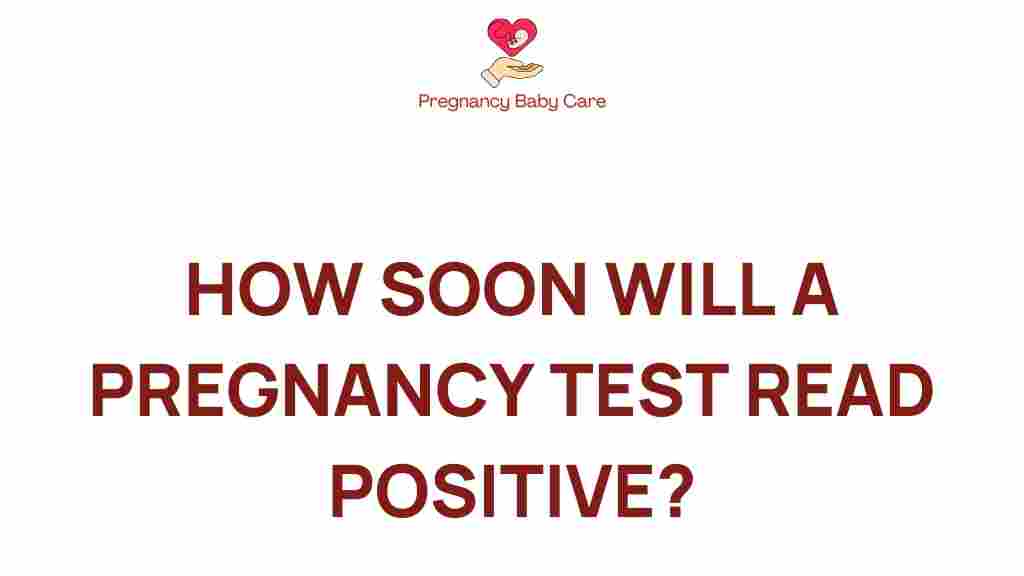Unveiling the Timeline: When Will a Pregnancy Test Show Positive Results?
When it comes to determining whether you are pregnant, understanding the timing of a pregnancy test is crucial. Many women find themselves eager to know if they are expecting, but the crucial question is: when will a pregnancy test show a positive result? This article will delve into the details of conception, hormone levels, and the best timing for taking a home test, helping you navigate this exciting yet uncertain time.
Understanding Conception and Hormone Levels
To comprehend when a pregnancy test can deliver a positive result, it’s important to first understand conception and hormone levels. After fertilization of the egg by sperm, the fertilized egg travels to the uterus, where it can implant into the uterine lining. This process usually occurs about 6 to 10 days after conception.
Once implantation occurs, the body begins to produce the hormone human chorionic gonadotropin (hCG). This hormone is the key marker that pregnancy tests detect. The levels of hCG in the bloodstream rise rapidly in early pregnancy, doubling approximately every 48 hours. Therefore, the timing of your test can significantly affect the result.
When Can You Take a Home Test?
The best time to take a home pregnancy test depends on various factors, including your menstrual cycle and when you believe you conceived. Here’s a step-by-step guide:
- Day of Expected Period: Most home tests are designed to be taken on the first day of your missed period. By this time, the hCG levels should be high enough for detection.
- One Week After Missed Period: For more accurate results, waiting one week after your missed period is advisable. This allows for higher hormone levels, increasing the chances of a positive result.
- Early Detection Tests: Some tests claim they can detect pregnancy as early as 5 days before your expected period. However, these tests are more sensitive and may yield false negatives if taken too early.
How to Increase Accuracy of Home Tests
To ensure the most accurate results when taking a home pregnancy test, consider the following:
- Follow Instructions: Always read and follow the instructions provided with the test kit carefully.
- Use Morning Urine: Testing with your first morning urine can yield more accurate results because it contains the highest concentration of hCG.
- Check Expiration Dates: Make sure the test is not expired, as this can affect its accuracy.
What If You Get a Negative Result?
Receiving a negative result on a pregnancy test can be disheartening, especially if you suspect you are pregnant. Here are some troubleshooting tips:
- Retest After a Few Days: If you get a negative result but still haven’t started your period, wait a few days and test again.
- Check for Timing: Ensure you tested at the right time. Testing too early can lead to false negatives.
- Consult a Doctor: If you continue to receive negative results and suspect pregnancy, it may be best to consult a healthcare provider for a blood test, which can detect lower levels of hCG.
Understanding False Positives
While false positives are rare, they can occur. Here are some reasons why you might receive a positive result when you’re not pregnant:
- Chemical Pregnancy: This occurs when a fertilized egg implants but fails to develop properly.
- Medications: Some medications, particularly those containing hCG, can cause false positives.
- Medical Conditions: Certain medical conditions, such as ovarian cysts or certain cancers, can produce hCG.
Conclusion: Trust the Process
In summary, knowing when a pregnancy test will show a positive result involves understanding your body, hormone levels, and the timing of the test. Be patient and give your body the necessary time to produce detectable levels of hCG. If you experience uncertainty, don’t hesitate to reach out to a healthcare professional for guidance.
For more information on pregnancy and reproductive health, visit this resource. If you’re looking for further insights into understanding your cycle and fertility, check out this article.
Remember, every woman’s body is different, and while the waiting can be tough, the journey to motherhood is a unique experience filled with hope and anticipation.
This article is in the category Pregnancy and created by PregnancyBabyCare Team
